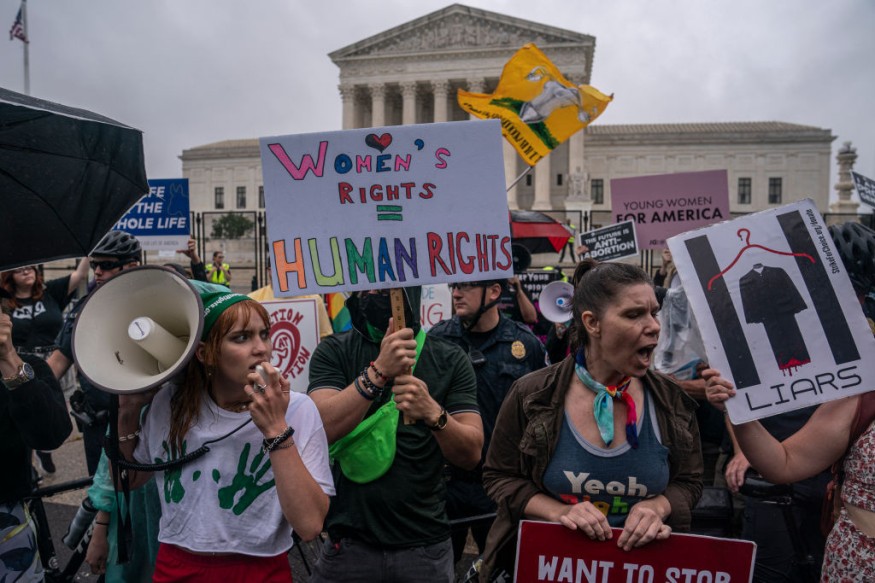Mexican Feminist Groups Are Helping US Women Gain Access to Abortion After Roe v. Wade Overturned

Mexican feminist groups have been helping counterparts in the United States to gain access to abortion after the U.S. Supreme Court overturned Roe v. Wade.
The high court overturned the landmark decision last week that allowed states to either ban or severely limit abortion rights in the country.
And as more and more American women are losing access to abortions, Mexican feminist collectives' networks in Mexico have pitched in, and these groups of activists are expected to ramp up efforts.
According to Associated Press, these may include smuggling abortion pills inside teddy bears, using a New York home as a pill distribution hub, and using a small apartment south of the U.S.-Mexico border as a safe abortion clinic.
NPR reported that most of the states seen to ban abortions would be red states that voted for former President Donald Trump.
Mexican Feminist Groups in Mexico See Rise of U.S. Women Seeking Their Aid
The organizations have stated that 1,700 women from the United States have sought their help this year. That number may seem small, but it has risen since the Supreme Court decision and is seen to increase even more.
According to Sandra Cardona, a member of one of these collectives based in Monterrey City, the demand will triple. She said that before the decision, they accompanied up to five women a month from the U.S. Now, they are accompanying between five to seven a week.
The strategy that these organizations employ is to promote a self-managed abortion. This means that women wanting to end their pregnancies must take misoprostol and mifepristone pills themselves.
However, representatives from these organizations would still accompany these women when they take the drugs. In most cases, they do this virtually.
The AP reported that these drugs are legal in the United States, with more than half of the abortions performed in the country in 2020 using them. However, they require a doctor's prescription, and in some states, they need a doctor present.
These drugs are also usually taken in women's health clinics, though many have been forced to close following individual states enacting more restrictive laws.
Like in the United States, abortion is also not completely legal in Mexico. The country is majority Catholic, and abortion is seen as a sin. Some 22 Mexican states have banned abortion, though 10 states have legalized it.
READ NEXT : 46 Migrants Found Dead Inside Semi-Truck in Texas; Greg Abbott Blames Joe Biden for Horrific Tragedy
How These Mexican Feminist Groups in Mexico Help American Women
How these organizations and collectives work all depends on their location. According to Unasse member Amelia Ojada, Mexican feminist groups operating far from the U.S.-Mexico border, such as Unasse in Mexico's Yucatan Peninsula, usually coordinate donations abroad to purchase pills.
However, more northern Mexican states that border the U.S. focus more on how they will transport pills. These include using toys, clothing, jars of vitamins, and more to hide and transport these pills.
They will then go inside so-called "medicine banks," which can be found in private homes in large cities in Texas. There are also some of these in New York. Though women there has more freedom when it comes to abortion rights.
After they reach the "medicine banks," these pills would then be distributed by volunteers keeping a low profile. They do this by several means, from hand-to-hand delivery to even mailing the pills.
However, even before they could arrive in their "medicine banks," border agents could still intercept volunteers crossing the border.
Marcela Castro of Green Tide Chihuahua told AP that it's like crossing the border with more illegal substances. She also said there were also women who lived between the two countries who carried the pills whenever they flew.
Cardona noted that they opened their doors to Americans five years ago. At first, most women thought they were getting scammed but were surprised how these organizations have been protecting them.
Cardona jested that their Paypal link has never been used so much. However, Cardona also pointed out that while the women realize they could do the abortion in their own homes, this becomes important later on, as these women can pass on the message.
So far, most Americans seeking help from collectives in Monterrey and Chihuahua have been Latina and Black.
This article is owned by Latin Post.
Written by: Rick Martin
WATCH: Roe v. Wade Is Overturned. How Does This Affect You? - From CNN
Subscribe to Latin Post!
Sign up for our free newsletter for the Latest coverage!
















